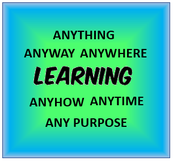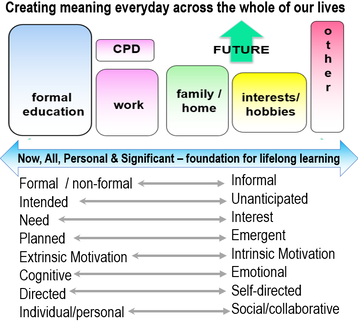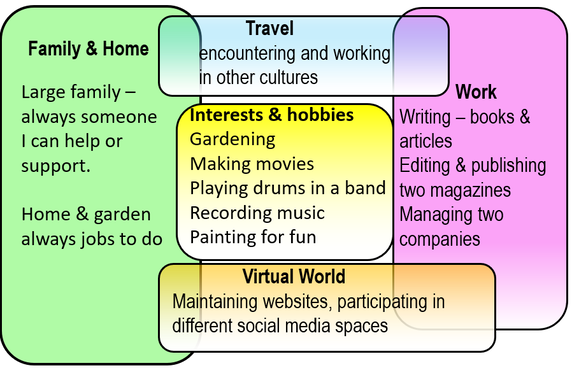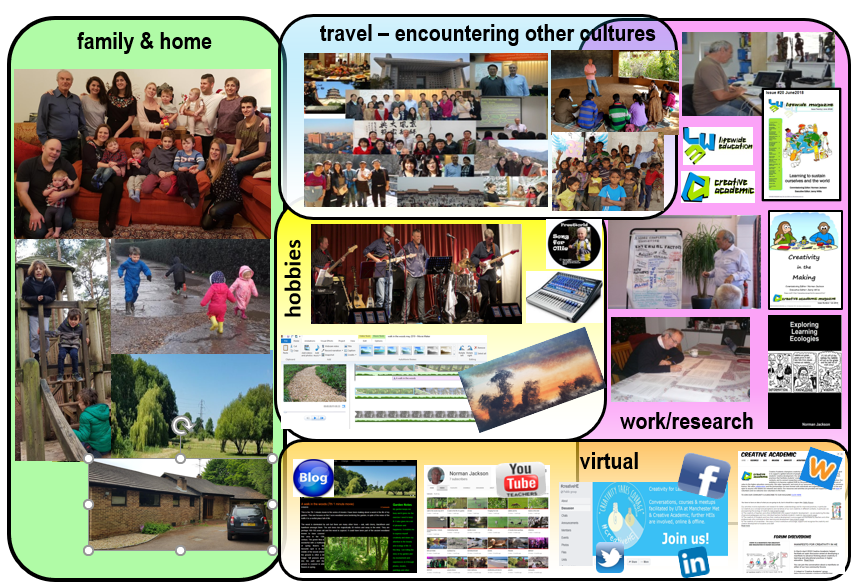
PROJECT WEBPAGE
Towards a Better Understanding of Our Own Learning Lives
February 1st to March 15th Facilitated by Norman Jackson, Rob Ward & Jenny Willis
Our collaborative inquiry aims to explore the nature of lifewide learning – how, why, when, what and where learning emerges in the everyday lives and practices of participants. The outcomes will inform Lifewide Education’s strategy for encouraging and supporting lifelong-lifewide learning.
Towards a Better Understanding of Our Own Learning Lives
February 1st to March 15th Facilitated by Norman Jackson, Rob Ward & Jenny Willis
Our collaborative inquiry aims to explore the nature of lifewide learning – how, why, when, what and where learning emerges in the everyday lives and practices of participants. The outcomes will inform Lifewide Education’s strategy for encouraging and supporting lifelong-lifewide learning.
|
Over six weeks we are inviting participants to pay more attention to their learning in the different domains of their life, and to describe their experiences and insights in a series of learning vignettes. The collection of vignettes and reflections on learning will provide a useful database through which to develop our understanding of adult lifewide learning.
Guide 28/01/21
Background Paper 28/01/21
| |||||||||||||
Introduction
We have 60 participants with representatives from 17 countries - UK, Bulgaria, Nepal, Australia, New Zealand, Ireland, USA, Canada, Zanzibar, France, Poland, Indonesia, Philippines, Pakistan, Iran, Columbia and China.
power point slides pdf version
We have 60 participants with representatives from 17 countries - UK, Bulgaria, Nepal, Australia, New Zealand, Ireland, USA, Canada, Zanzibar, France, Poland, Indonesia, Philippines, Pakistan, Iran, Columbia and China.
power point slides pdf version
|
| ||||||||||||
Introductory Microsoft Teams Meeting
CONTENTS
Dr Doug Cole Chair
0-11 mins Participant introductions
11-36 mins Project Introduction by Norman Jackson
37-56 mins General discussion
|
|
|
Closing Meeting March 15th
Chair Rob Ward ·Our social ecology for learning ·Emerging thoughts about lifewide learning and domains for experiential learning ·DISCUSSION ·Our social ecology for learning ·Your feedback on your experience ·DISCUSSION · ·Next steps - synthesis & dissemination ·DISCUSSION FEEDBACK QUESTIONNAIRE
How participants evaluated their experience
|
Powerpoint slides
Powerpoint slides
Powerpoint slides
| ||||||||||||||||||||||||||||||
Research Process
1 We will launch the project with an online meeting to introduce the process and provide opportunities for discussion on Monday Feb 1st 12.00-13.00. Link to be provided.
2 You are invited to prepare a map showing the different domains in your life in which you experience living, learning and developing yourself and achieving things that matter to you. The map should represent the current situation. It can be text-based or it can include photographs to enhance the contextual information (Figure 1). A template is provided in Annex 1. The map provides a reference point for experiences you will describe during the inquiry.
Figure 1 Examples of text- and -image based experiential domain & activity maps.
1 We will launch the project with an online meeting to introduce the process and provide opportunities for discussion on Monday Feb 1st 12.00-13.00. Link to be provided.
2 You are invited to prepare a map showing the different domains in your life in which you experience living, learning and developing yourself and achieving things that matter to you. The map should represent the current situation. It can be text-based or it can include photographs to enhance the contextual information (Figure 1). A template is provided in Annex 1. The map provides a reference point for experiences you will describe during the inquiry.
Figure 1 Examples of text- and -image based experiential domain & activity maps.
3 We hope that as each day unfolds you will be conscious of the situations in which you are learning and how the need to learn something emerges in whatever you are doing. We also hope that you will spend a few minutes reflecting on your experiences and, when something noteworthy emerges, you will create a short vignette describing what happened and its significance to you. We are not expecting stories of major transformative experiences. Rather, we are expecting stories about everyday situations and happenings that we don’t often pay attention to.
Ideally your vignette will comprise a text-based narrative typically 400-500 words (no more than 1 A4 page). It can include photos or other images. Examples are provided in the Guidance.
It would be helpful to include the following information:
4 We want to encourage ongoing conversation and interactions between participants so we have set up a private conversation and learning space on Linked In. Please use this ‘safe’ space to share your experiences and the insights you gain from them and if possible your vignettes of learning. We encourage you to value other contributions and offer your own constructive commentary and questions aimed at promoting deeper reflection and understanding.
5 At the end of the whole process we will provide an opportunity for participants to come together in a final meeting to share what we have all learnt about the way learning that we have not planned for, emerges in our life.
After the process has finished
We would like to curate some of the knowledge we gain from this collaborative learning process for the benefit of the wider community of educators, but there is no obligation to participate in this additional process. We will invite all participants to prepare a short reflective account of what they have learnt through the process, drawing on their vignettes and the process as a whole, for publication in the June Issue of Lifewide Magazine. We will discuss this further in our final meeting on March 15th.
Summary of research process
Ideally your vignette will comprise a text-based narrative typically 400-500 words (no more than 1 A4 page). It can include photos or other images. Examples are provided in the Guidance.
It would be helpful to include the following information:
- Title : The substantive theme
- Domain: Identifies the part of your life in which the experience occurred
- Narrative: describing an experience that was meaningful/significant to you from any part /domain of your life including information on such things as context, situations, the environment and how, why and what learning emerged
- Reflections on what was learnt & why it was meaningful/significant together with any insights, wisdom and principles relating to everyday learning
4 We want to encourage ongoing conversation and interactions between participants so we have set up a private conversation and learning space on Linked In. Please use this ‘safe’ space to share your experiences and the insights you gain from them and if possible your vignettes of learning. We encourage you to value other contributions and offer your own constructive commentary and questions aimed at promoting deeper reflection and understanding.
5 At the end of the whole process we will provide an opportunity for participants to come together in a final meeting to share what we have all learnt about the way learning that we have not planned for, emerges in our life.
After the process has finished
We would like to curate some of the knowledge we gain from this collaborative learning process for the benefit of the wider community of educators, but there is no obligation to participate in this additional process. We will invite all participants to prepare a short reflective account of what they have learnt through the process, drawing on their vignettes and the process as a whole, for publication in the June Issue of Lifewide Magazine. We will discuss this further in our final meeting on March 15th.
Summary of research process
Some questions to keep in mind when reflecting on a learning experience
- MEANING: What does learning mean to me in the context of my own life experiences?
- MEANING: Does learning mean the same thing in different contexts and in different parts of my life?
- MEANING: Am I learning something entirely new or developing/adapting something I already know and can do?
- CONTINUITY: How did my past experiences influence what I did to learn in my present?
- CONTINUITY: How does what I have learnt shape my plans for future learning?
- CONTEXT: What was the context for learning?
- ENVIRONMENT: How did my environment and the people and things in it influence my learning?
- ENVIRONMENT: How does place or space influence my learning? Some things can only be learnt in a particular place/space.
- ENVIRONMENT: What resources did I utilise when I was learning?
- RELATIONSHIPS: What relationships helped/enabled me to learn?
- OPPORTUNITY: How/when did I recognise the opportunity to learn and decide to act upon it?
- PROCESS: What sort of activities did I engage in, in order to learn?
- PROCESS: What mediated/facilitated my interactions with my environment?
- MYSELF: What motivated me to try to learn?
- MYSELF: What has changed as a result of learning?
- BEYOND MYSELF: Will I share what I have learnt with others (beyond this project) or not?
- Please add your own questions
The process is open to anyone who is interested in exploring their own lifewide learning and who is willing to share their experiences and insights with other participants. If you would like to participate please contact the facilitator Norman Jackson [email protected]




